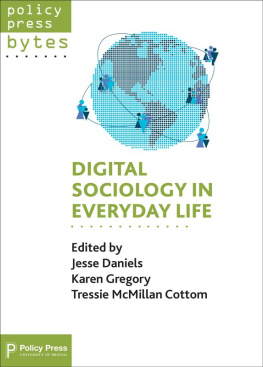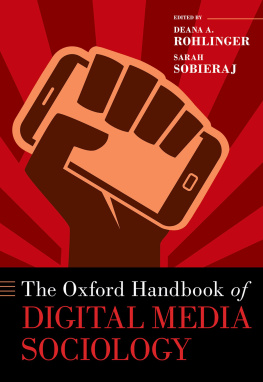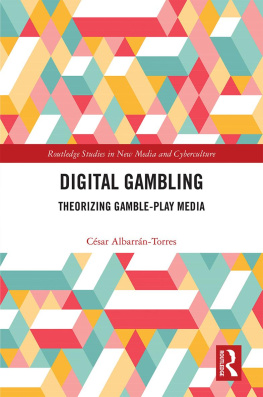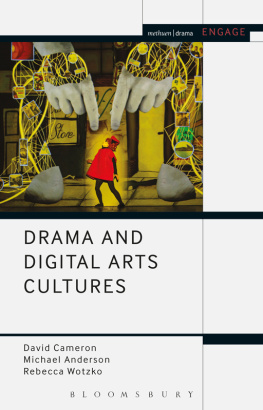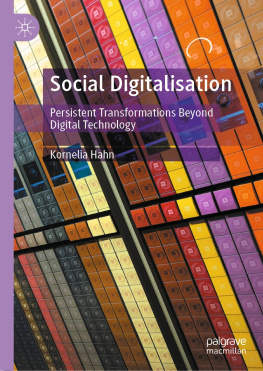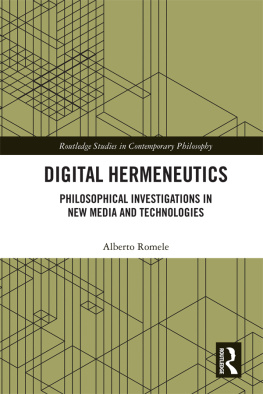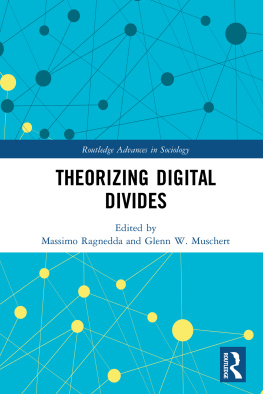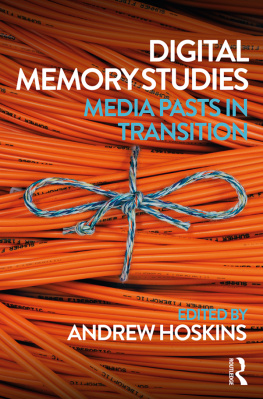MAKING DIGITAL CULTURES
Making Digital Cultures
Access, Interactivity, and Authenticity
MARTIN HAND
Queens University, Canada
First published 2008 by Ashgate Publishing
Published 2016 by Routledge
2 Park Square, Milton Park, Abingdon, Oxon OX14 4RN
711 Third Avenue, New York, NY 10017, USA
Routledge is an imprint of the Taylor & Francis Group, an informa business
Copyright Martin Hand 2008
Martin Hand has asserted his moral right under the Copyright, Designs and Patents Act, 1988, to be identified as the author of this work.
All rights reserved. No part of this book may be reprinted or reproduced or utilised in any form or by any electronic, mechanical, or other means, now known or hereafter invented, including photocopying and recording, or in any information storage or retrieval system, without permission in writing from the publishers.
Notice:
Product or corporate names may be trademarks or registered trademarks, and are used only for identification and explanation without intent to infringe.
British Library Cataloguing in Publication Data
Hand, Martin
Making digital cultures : access, interactivity, and authenticity
1. Information society 2. Information technology - Social aspects 3. Technological innovations - Social aspects 4. Technology - Social aspects 5. Digital media - Social aspects
I. Title
303.4'833
Library of Congress Cataloging-in-Publication Data
Hand, Martin, 1971-
Making digital cultures : access, interactivity, and authenticity / by Martin Hand.
p. cm.
Includes bibliographical references and index.
ISBN 978-0-7546-4840-6 (hbk)
1. Information society--Social aspects. 2. Information technology--Social aspects. 3. Technological innovations--Social aspects. 4. Technology--Social aspects. 5. Digital media--Social aspects. I. Title.
HM851.H348 2008
303.48'33--dc22
2008005950
ISBN: 978-0-7546-4840-6 (hbk)
ISBN: 978-1-3155-9328-9 (ebk-PDF)
ISBN: 978-1-3171-0248-9 (ebk-ePUB)
Contents
List of Figures
List of Tables
Acknowledgements
Research for this book took place in a variety of forms in Britain and North America. I am grateful for the financial support of the Economic and Social Research Council (UK) and the Social Sciences and Humanities Research Council (Canada) in enabling me to undertake the various elements of this work. I offer sincere thanks to all participants for their time, passion, and expertise.
Many people have helped in different ways, most often without realizing it. A particular debt of gratitude is owed to Barry Sandywell and Elizabeth Shove for inspiration and mentorship. I acknowledge, however, that they might disagree with everything in this book. For encouragement, advice and friendship thanks to Lisa Garforth, Dale Southerton, Andrew Webster, Brian Woods, Anne Kerr, Nicholas Gane, Paul Rosen, Roger Burrows, Brian Loader and Steven Marmura. I also thank Fiona Kay, Catherine Krull, Vincent Mosco, Lynn OMalley and Rob Beamish. I am very lucky to encounter so many outstanding graduate students in the Department of Sociology at Queens University. Zain Lakhani was an excellent research assistant; Kimberley DeWolff now at UCSD has been an indispensable transcriber and critical reader of much of this. Kristina Marcellus, Dan Trottier, Kelly Reid, and Jennifer Harrington are full of great ideas.
Elements of the chapters have been presented at the Oxford Internet Institute, University of Oxford 2003; Society for Social Studies of Science Annual Meeting in Vancouver 2006; Departments of Sociology, University of York (UK) and Queens University, Ontario; Theory, Culture & Society 25th Anniversary Conference, University of Tokyo 2007. Thanks to Darin Barney, Geoffrey Bowker, Leah MacFadyen, Joan Schwartz, Andrew Roger, David Lyon, Mike Hardey, and Leslie Regan Shade for encouragement and suggestions.
Mandy astonishingly continues to put up with this and many other things. This book is dedicated to her. Oscar and Felix are a delight.
Earlier versions and sections of the following chapters have been published elsewhere. Permission to publish this material is gratefully acknowledged:
(with Barry Sandywell) (2002) in Theory, Culture & Society, Vol.19, No.12, 197225.
(2005) in Information, Communication & Society, Vol.8, No.3, September, pp.368393(26).
Chapter 1
Making Digital Cultures: An Introduction
Introduction
This book examines how digital technologies and techniques are being enfolded into the fabric of specific institutional and broader cultural environments. It is about the cultural significance of shifts from analogue to digital but it is not about the triumph of digitization in any homogenous sense. It is often about the rather uneasy alliances between analogue and digital objects, practices and processes, and how we might understand this from both the lofty heights of theory and the grounded practices of those directly engaged with taking the digital turn. There is no definitive model of digital culture and as such the book tries to explore and illuminate emerging tendencies at different moments and in different places, and from different theoretical angles. Instead of reading backwards and finding the ends of such efforts, it looks at the digital turn inside three sites the public library, the business organization, and the national archive asking what is being made, how this is or is not achieved, and who or what we might consider to be the architects. For some of the advocates and detractors involved, shifting toward digital culture is primarily about the provision of access; in other environments it involves engagements with novel business practices in relation to that interactive digital culture out there; for others it is wrapped in unresolved issues of memory making, authenticity and the possibility of managing histories. In examining the often diverse range of efforts to bring digital cultures into being, to reorganize existing institutional and other environments around sets of digital ideals, this book presents a different take on some of the dynamics of the seemingly inevitable convergence culture in the twenty first century (Jenkins 2006).
To question ubiquity and inevitability might appear a strange way of proceeding in that anecdotally at least those in the west or global north appear to be fully immersed in all things digital. Many people now live in a culture of 24/7 instant messaging, iPods and mp3s, streamed content, blogs, ubiquitous digital images, and Facebook. It is noticeable that many more environments involve digital media of some sort, from the routine gathering of data, the ubiquity of software, to the presence of wireless technologies. It is also the case that increasingly, cultural, social, economic and political issues and concerns involve digital media, where digital media is both the channel and forms the central topic of discussion. This is most acute when an event in news journalism becomes both dispersed through digital media (blogs, cameraphone images, web based commentary) and in turn invites reflection upon those media and their role in shaping the event, its reception and its ongoing reinterpretation. The juxtaposition of older and newer technological objects and practices is striking and it is this that provides the backdrop to this book. In the book, I bring together recent theorizing of the novelty of the digital age with empirical studies of how different institutions are adopting these technologies in relation to older established technological processes and practices.


